 Do you blog? Are you thinking of publishing a book?
Do you blog? Are you thinking of publishing a book?
Eighty-one percent of the US population says they want to write a book.
Not surprisingly, only about two percent ever actually do it.
Most bloggers, on the other hand, write a ton of books—probably three or four books per year on average, but most of them don't ever realize they've done so.
Later—sometimes much later—they realize they're sitting on a ton of content that could be turned into a book.
Many make the mistake of not bothering to consciously write a book. They just blog.
Here's a better way: Plan out the content for a book, then write the book in post-sized bits every day and publish the posts—the book—on your blog.
When you blog a book, you produce both a manuscript and a fan base that avidly reads your blog and may eventually also purchase the final product: your printed or digital book.
How to Become an Author AND a Blogger
Each time you hit the Publish button on your blog, you publish your work. That means you become a publisher. But you haven't produced a book, which means you're not an author. Nor have you become a successful author.
If you're a businessperson, keep in mind that a book is the best business card you can ever hand a potential client or customer.
A book makes you an author expert—an authority in your field. Your blog also elevates you into the realm of thought leader and expert. Thus, by blogging and by blogging a book or booking a blog, you boost your business.

There are five ways you can use your blog to turn yourself into the successful author of a book.
#1: Blog a Book
With this method, you treat the content you produce on your blog much like you would if you were writing a book from scratch
- Choose a blog topic based on marketability and competition in both the blogosphere and the bookstore.
- Then schedule your content carefully based on a plan that fills each chapter of your book in post-sized bits (250-500 words).
- Also create a promotion plan that includes social media as well as traditional media—your blog serves as the centerpiece of that plan. Author Michael Stelzner (and founder of this site) wrote a great post about how to promote a book using social media. You might want to add some of his suggestions to your plan.
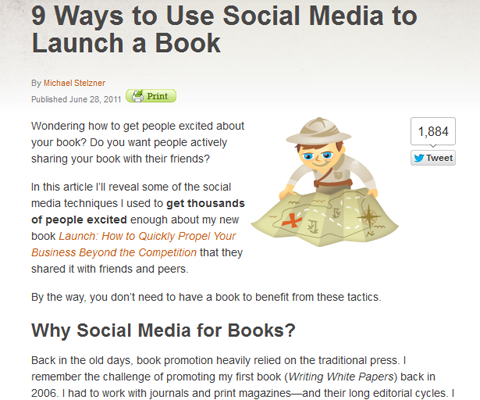
The best ways to promote yourself and your book is via social media, but blogging provides the pivot point for your promotion plan. - Write and post consistently (2-7 times per week or more).
- Promote your blog to build the fan base—the author platform, as it is called in the publishing world—necessary to create a successful blog, and subsequently a successful book; one that sells to readers and publishers.
Since you'll be creating a book on your blog, here are some important steps for blogging a book:
Get World-Class Marketing Training — All Year Long!
Are you facing doubt, uncertainty, or overwhelm? The Social Media Marketing Society can help.
Each month, you’ll receive training from trusted marketing experts, covering everything from AI to organic social marketing. When you join, you’ll also get immediate access to:
- A library of 100+ marketing trainings
- A community of like-minded marketers
- Monthly online community meetups
- Relevant news and trends updates
- Set up categories based on your chapters. Don't use creative names; use searchable terms or keyword phrases.
- Create a page for a table of contents. I have a widget on the right sidebar of my of my blog that directs readers to the table of contents of the original blogged book. When the book was being blogged, it helped readers find the table of contents and read from the beginning of the book.
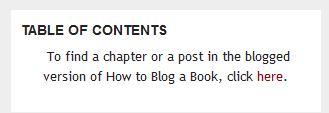
Since How to Blog a Book is both a book and a blog now, this box, which appears on the blog, directs readers to the table of contents for the blogged book. When you click through, you land on this page:
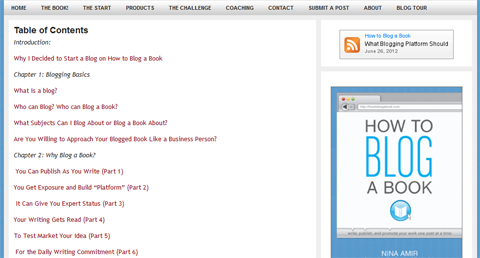
By looking at my table of contents, you can see how I "built" the first draft of my book a post at a time. Each entry is a link to a post. Each post represents one small piece of the book. (I posted 3-4 times per week and produced a 26,300-word first draft in 5 months.) - Create a way for readers to turn pages. Either have “previous post” and “next post” links at the bottom or use a plugin that allows readers to “turn the page.” For the first draft of my blogged book, I created these links manually, and they looked like this:

Creating this navigation system requires some extra manual work on the blogger's part—remember to do it each time you post. - Now I use a WordPress plugin called Single Post Navigation. The arrows are huge and scroll up and down the page as you read.

These arrows (above the red arrows) follow the reader and are extremely easy to use. They only appear when you click through to individual posts and then begin navigating from post to post. - Be prepared to continue blogging on your topic when the book is complete. Your blog lives on even when you finish the book, so have a content plan that extends beyond that last page.
#2: Blog a Short Book (a series)
If the thought of blogging a full-length book still feels overwhelming, produce a short book. Using the same steps as above, plan out a series of posts on a topic, and then write and publish them on your blog over the course of 10-30 days.

Discover Proven Marketing Strategies and Tips
Want to go even deeper with your marketing? Check out the Social Media Marketing Podcast! Publishing weekly since 2012, the Social Media Marketing Podcast helps you navigate the constantly changing marketing jungle, with expert interviews from marketing pros.
But don’t let the name fool you. This show is about a lot more than just social media marketing. With over 600 episodes and millions of downloads each year, this show has been a trusted source for marketers for well over a decade.
Darren Rowse of Problogger (the blog and the book) did this successfully with his series, 31 Days to Build a Better Blog. It's now his best-selling ebook.
I blogged a 10-day series on one of my blogs, As the Spirit Moves Me, and produced a book, 10 Days and 10 Ways to Return to Your Best Self.
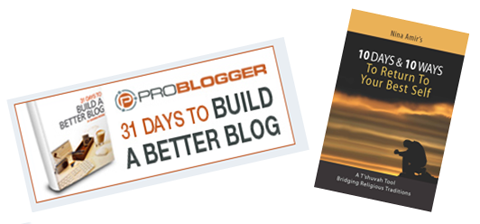
To blog a short book, find a topic that solves a problem, answers a question or in some way adds value to your readers' lives. Do this with a short or a long book, and you will produce a winner every time as well.
To blog a short book:
- Make a content plan for the period of time you want to cover.
- Write your posts on schedule.
- Publish that content on your blog.
- Create interest for the series using social media.
- Edit the series and package it as an ebook or printed book.
In some cases, as in Darren's, you might find your readers asking for a really great series to be produced as a book. But you can reproduce that result many times on your blog, and become a multiple-book author.
#3: Book Your Blog
To book a blog, create a content plan (this time for a full-length book) out of repurposed blog posts. However, rather than writing your posts from scratch, search out existing blog posts to fill your chapters.
Here are a few tips for creating a winning booked blog:
- Book a blog worth reading, not the book you happened to blog. Not every blog contains a book. Make sure yours does before you publish it.
- Edit and revise the manuscript you create. Make sure your book flows, makes sense, isn't disjointed and contains all of the necessary content.
- Add new content. This will entice your regular blog readers (and possibly a publisher) to purchase the book.
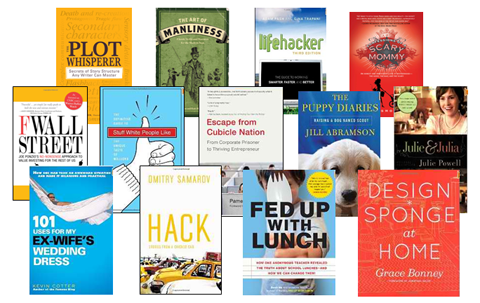
#4: Blog Your Way to a Book Deal
You can blog a book—or just blog—with the intention of attracting a literary agent or a publisher. Publishing professionals troll the blogosphere (and social networks) looking for successful bloggers. To them, a successful blog represents a thoroughly test-marketed book idea, as close to a sure bet as they can get when they decide to invest in a new author.
A successful blog, one with lots of readers, acts like a beacon to agents and publishers. When they follow the light—the trail of readers—to your blog, they have what they want: numbers. Wow them with your unique visitors and page views.
If your numbers aren't as large as you'd like (or they'd like), at least show growth month to month. Google Analytics tends to be the most accurate measure of these numbers, but your hosting company probably has analytics as well, and these can prove more impressive.
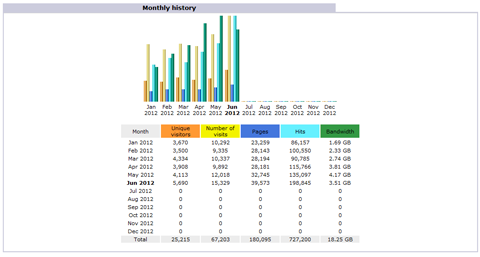
#5: Blog Your Way to a Successful Self-Published Book
The work you've done to build readership will help you succeed as an author even if you don't land a traditional publishing deal.
A successful blog offers you the platform—the fan base—you need to successfully self-publish.
Your blog readers will gladly purchase a digital or printed book based on their favorite blog and written by their favorite blogger. Give them a souvenir to take home. They'll be happy to do so.
And guess what? Your name will be on the cover. You'll have moved into the two percent. You'll have become an author.
What do you think? Do you plan to become an author by blogging a book or booking a blog? Have you blogged a book or booked a blog already? Leave me a comment in the box below.
Image from iStockPhoto.
Attention Agency Owners, Brand Marketers, and Consultants

Introducing the Marketing Agency Show–our newest podcast designed to explore the struggles of agency marketers.
Join show host and agency owner, Brooke Sellas, as she interviews agency marketers and digs deep into their biggest challenges. Explore topics like navigating rough economic times, leveraging AI, service diversification, client acquisition, and much more.
Just pull up your favorite podcast app, search for Marketing Agency Show and start listening. Or click the button below for more information.

